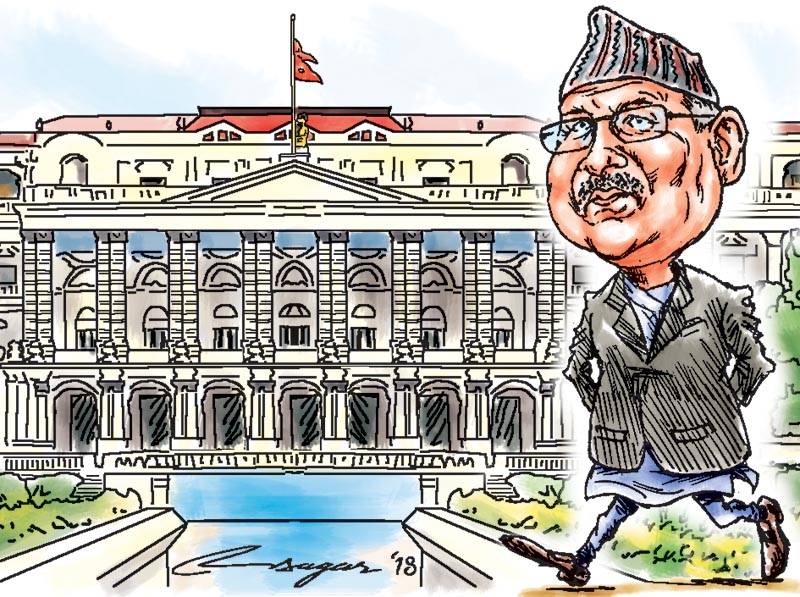Oli’s return to power: Time to deliver on promises
While giving impetus to development, Oli, who has returned to power with a comfortable majority, should start working to discourage corruption, nepotism and partisan preferences, which have plagued the country for long
Restoration of democracy in 1990 though ushered in a new era, due to squabbling among parties and other various reasons, the country failed to get stable governments which could rule for a full five-year term. The last 27 years were mired in political instability. On top of that, the Maoist insurgency from 1996 to 2006 made us face what many do not hesitate to term “a lost decade”.
When Nepali Congress’ Sher Bahadur Deuba came to power in June last year, for the fourth time, with the responsibility of holding the crucial parliamentary and provincial elections under the new constitution adopted in 2015, he became the 24th prime minister in 27 years. But in the recently held elections, the left alliance of the CPN-UML and CPN-Maoist Centre has emerged victorious and UML’s KP Sharma Oli has returned to power, for a second time. Oli, along with the support of the CPN-MC with which his UML is on course to unify to make Nepal Communist Party, now commands majority to govern for a full five-year term. This is an unprecedented event in Nepali politics since 1990. This has sent positive vibes among the general public, for they are hoping political stability, which they believe will usher in a new era of economic activities.
Oli won the elections on the plank of what the left alliance called “stability for prosperity”, something which struck the right chord with many Nepalis who voted for the two parties. Oli’s UML also for the first in 27 years has emerged as the single largest party. Now is the time for Oli to deliver on the promises made from the election hustings.
Now, Prime Minister Oli should divide his focus into two parts: immediate need and the long-term goals.
The Madhes-based parties’ demand of constitution amendment still remains outstanding. The issue is set to emerge again now. Prime Minister Oli should make all the efforts to take them into confidence and forge consensus on addressing their genuine concerns. He needs to start the process of amending the constitution in the most justifiable way possible. Ensuring broader acceptance by taking the disgruntled forces into confidence will be the bedrock of stability.
Then there are earthquake victims who still feel neglected even almost three years after the disaster. The Oli government must work swiftly to address their concerns. Some tangible progress needs to be made immediately to rehabilitate them and help rebuild their houses. The reconstruction works have remained tardy, with many quake survivors still feeling that there is no government for them. Victims of the last monsoon floods are in also dire need of support. The government needs to pay heed to their plight. Through the new constitution, we have introduced secularism, federalism and republicanism.
Elections in seven provinces, carved out as per the new constitution, have already been held. Governments in all seven provinces also have been formed. Local elections have installed local governments across the country after a gap of 17 years.
Now comes the part of sustenance. The federal government at the centre should coordinate with provincial governments and Prime Minister Oli has the crucial role to play.
When it comes to foreign policy, Oli has to work with dexterity to improve ties with our immediate neighbours—India and China. He also needs to come up with a concrete plan to foster India-Nepal-China relations for the economic betterment of the country.
Now with governments at all levels in place, it is time to give impetus to development works. Oli has to work hard to realise the dream of prosperity.
East Asian nations in recent years have achieved inexplicably exponential economic growth. A single project can make a huge impact in a country’s economy if operated seriously. Samsung’s businesses are estimated to account for around 15 per cent of South Korea’s entire economy. Japan and Thailand have made marvellous improvements in the last two decades. China brought 12.4 million people above poverty line in 2016. These are great examples in our neighbourhood, to which we have been a mere spectator for so many years.
Economic development is what matters the most to people. Oli should take some bold decisions to economically lift the country and the people. He needs to immediately start working on some projects which can bring positive changes on public’s lives. There is a sense of urgency among the people. While giving impetus to development, Oli, who has returned to power with a comfortable majority, should start working immediately to discourage corruption, nepotism and partisan preferences, which have plagued the country for long.
Nepal’s employment rate hovers around 40 per cent, which means majority of youths are forced to fly abroad, mostly Gulf nations and Malaysia, in search of job. There is an urgent need to create employment opportunities so as to keep the youths within the country. Steps should be taken to this effect.
Some powerful breakthroughs are a must to make people feel that Oli’s politics is for positivity and progress. If Oli succeeds in these aspects, he can create a space for himself as a leader of the people. People have voted him into power, now it is time for Oli to deliver on his promises.
Dahal is associate professor at Kathmandu School of Law






